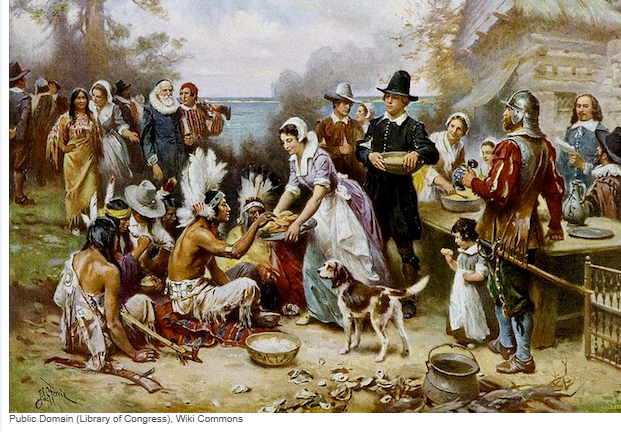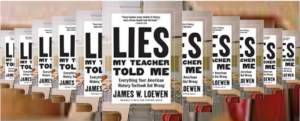
Essay 12: How Thanksgiving Helps Keep Us Ethnocentric
Recognizing that inaccurate history often subtly promotes continuing white supremacy, the National Education Association (NEA) commissioned these articles and has posted some of them in slightly different form at its website. I thank Harry Lawson and others at NEA for the commission, for editorial suggestions, and for other assistance.
Thanksgiving is a splendid holiday, connecting family and friends over traditional American foods. At the same time, the holiday helps students ignore important facts in our past, makes them ethnocentric, and generates complacency about social inequality. However, teachers can make Thanksgiving an eye-opening teaching opportunity.
As to facts left out, consider my oldest U.S. history, J. W. Barber’s Interesting Events in the History of the United States, published in 1829. It tells why the Pilgrims settled in Plymouth, Massachusetts:
A few years before the arrival of the Plymouth settlers, a very mortal sickness raged with great violence among the Indians inhabiting the eastern parts of New England. “Whole towns were depopulated. The living were not able to bury the dead; and their bodies were found lying above ground, many years after. The Massachusetts Indians are said to have been reduced from 30,000 to 300 fighting men. In 1633, the small pox swept off great numbers.”
Thus an entire village was available for the newcomers’ use, including cleared fields and a cleared spring.
These plagues are part of the Columbian Exchange, the vast process Christopher Columbus started. Ships from Europe carried livestock, arms, ideas, and diseases to the Americas and returned with crops, precious metals, ideas, and slaves. This is the most important phenomenon in history’s last thousand years. Some recent U.S. history textbooks cover it (but even they leave out the west-to-east transfer of ideas), but earlier ones don’t, so teachers may not know about it.
Native Americans were biologically unprepared for the poxes and other diseases brought from Eurasia and Africa. They died by the millions. Thanksgiving is a good time to teach about this, because the plagues explain why the Wampanoags welcomed the Pilgrims to Plymouth. Decimated by disease, their welcome was a rational response to their newly weak demographic position compared to their traditional enemies to the west. They welcomed the English partly to create an obligation and gain them as allies.

Absent this explanation, their hospitality at Thanksgiving seems kind, yes; but also inexplicable, even hapless.
Thanksgiving also proclaims our myth of American exceptionalism. Unlike crass European nations, the United States supposedly was founded for freedom of religion. Never mind that the “Pilgrims” already had freedom of religion in Holland. Never mind that 1620 wasn’t the beginning of the U.S. anyway.
American exceptionalism in turn is a key factor in causing Americans to be excessively ethnocentric. Ethnocentrism is the practice of ranking one’s own culture as the best and judging other cultures as deficient whenever they deviate from ours. All societies are ethnocentric, but Americans are particularly susceptible, because our economy, military, and in some ways our culture also dominate the globe. Thanking God for these blessings upon as us a nation is hardly a Danish perspective, or a Kenyan one. There are historical reasons for our success; thanking God only obscures them.
At Thanksgiving it is also customary to thank God for “His” blessings upon our family. Students from successful families can assume that God approves their status and wealth. Students from unsuccessful families are left to deduce that God may similarly approve their lowly position. Either way, this practice can encourage students to infer the imprimatur of the Almighty upon the American class structure. Since American history textbooks mystify and even deny our class structure, Thanksgiving provides a teachable moment to bring it up.
Essential Reading
- Loewen, “The Truth about the First Thanksgiving,” Chapter 3 of Lies My Teacher Told Me, tells about the waves of disease that swept the Americas and points out other problems with textbooks’ usual storyline about the Pilgrims. Chapter 7, “The Land of Opportunity,” shows how they get social stratification wrong too.
- Michael Dorris, “Why I’m Not Thankful for Thanksgiving,” www.rethinkingschools.org/static/publication/rcpm/rpcmflyer4web.pdf, shows what’s wrong with some of the usual activities schools do around Thanksgiving, from the perspective of a Native American parent.

All essays in the Correct(ed) series:
Introducing the Series
Essay 2: How to Teach Slavery
Essay 3: How to Teach Secession
Essay 4: Teaching about the Confederacy and Race Relations
Essay 5: Confederate Public History
Essay 6: Reconstruction
Essay 7: Getting History Right Can Decrease Racism Toward Mexican Americans
Essay 8: Problematic Words about Native Americans
Essay 9: How and When Did the First People Get Here?
Essay 10: The Pantheon of Explorers
Essay 11: Columbus Day
Essay 12: How Thanksgiving Helps Keep Us Ethnocentric
Essay 13: American Indians as Mascots
Essay 14: How to Teach the Nadir of Race Relations
Essay 15: Teaching the Civil Rights Movement
Essay 16: Getting Students Thinking about the Future